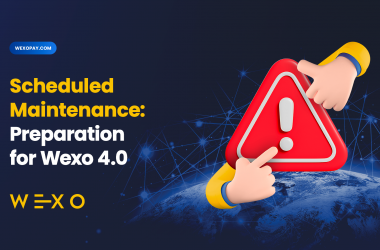Ethereum celebrates 8th anniversary while Bitcoin mines its 800,000th block
BITCOIN (BTC) BLOCKCHAIN ETHEREUM (ETH)02-Aug-2023

TOP-Beiträge

New Wexo Cashback App: More than cashback
Wexo launches a new generation of its Cashback app – a modern platform where you earn real value in Bitcoin, gold,...
Mehr lesen
Wexo 4.0 Is Coming: What to Expect from the Scheduled Maintenan...
We’re getting ready to launch Wexo 4.0 with a major infrastructure upgrade. Learn what’s changing, why a new passwo...
Mehr lesen
Deflation in Action: 3,541,053 WEXO Tokens Burned
The fifth burn round has permanently removed over 3.5 million WEXO tokens from circulation. Learn what this means f...
Mehr lesenEthereum celebrated its 8th anniversary on July 30th, and we marked the event while Bitcoin mined its 800 thousandth block. Since its inception in 2015, Ethereum has become one of the most prominent platforms in the cryptocurrency world. Over these 8 years, Ethereum has achieved many significant milestones. Its native currency Ether has become the second largest cryptocurrency in the world with a market capitalization of $225 billion, and the platform has become the basis for the creation of many innovative blockchain applications.
The 800,000 block of Bitcoin, which contained 3,721 transactions and was mined at a Bitcoin price of $29,815, became further proof of the security and resilience of this cryptocurrency. The reward for mining this block was 6.25 BTC. This significant milestone took place less than a year before the next halving is expected to take place in April 2024.
These two significant events in the crypto world are clear evidence of the constant evolution and innovation in the cryptocurrency industry. Ethereum and Bitcoin, regardless of the challenges and obstacles they have to overcome, continue to develop their potential and strengthen their position in the crypto industry.
Blockchain could save $10 billion in the financial sector by 2030

According to a recent report published by Ripple in partnership with the World Fast Payments Council (FPC), blockchain has the potential to save financial institutions approximately $10 billion in cross-border payments by 2030. The report was based on a survey of 300 financial professionals from 45 countries and a variety of sectors, including fintech, banking, media, consumer technology and retail. As many as 97% of respondents strongly believe that blockchain technology will play a key role in accelerating payment systems over the next three years.
The survey also revealed that more than half of the participants agree that the biggest advantage of cryptocurrency is its ability to reduce costs. Fintech analyst firm Juniper Research predicts that the use of blockchain in global transactions will deliver significant savings to banks over the next six years.
Although participants' opinions are divided as to when the majority of merchants will start adopting digital currencies, as many as 17% of all respondents expressed the belief that such adoption could take place within the next year. This data suggests that despite the differing opinions and challenges facing financial institutions, blockchain is expected to play an important role in global financial transactions in the future.
Putin signs law and digital ruble becomes viable in Russia

Russia is making progress on its central bank digital currency (CBDC) project, with President Vladimir Putin signing the Digital Ruble Law on 24 July. With this approval, the Digital Ruble Law comes into force on 1 August 2023. Virtually all of the rules are ready to be applied, except for one - the third article, which includes amendments to several federal laws of the Russian Federation, including those relating to bankruptcy and inheritance. These amendments are expected to enter into force in August 2024.
Under the new regulations, the Russian Central Bank will become the main operator of the digital ruble infrastructure and will assume responsibility for all stored assets. The digital ruble is designed as a method of payment and money transfer, while not allowing for investment use. The governor of the Russian central bank, Elvira Nabiullina, said that the use of the digital ruble will not be forced by citizens, but will be their voluntary choice.
Russian lawmakers continue to delay the introduction of cryptocurrency regulation despite the CBDC's rapid progress on legislation. According to the deputy governor of the Russian Central Bank, Olga Skorobogatova, the government does not expect mass adoption of the digital ruble in Russia before 2025 or even 2027.
